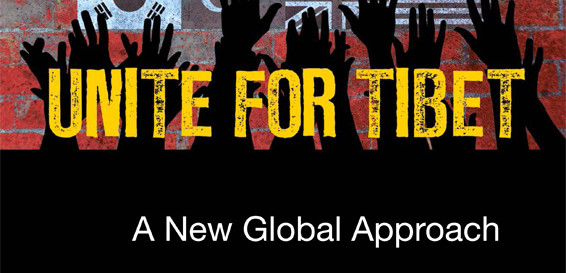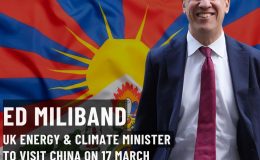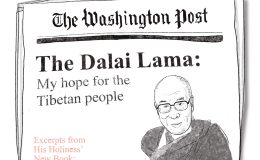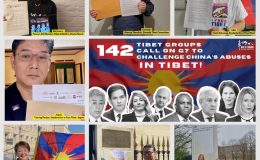Unite for Tibet: Campaigners urge G20 leaders to jointly tackle crisis in Tibet, as Xi Jinping attends first major multilateral summit
Press Release 4 September, 2013
New global approach needed to challenge Chinese President’s failed Tibet policies
Contacts:
Tenzin Jigme, International Tibet Network [English, Tibetan] +1 703 424 0015
Kyinzom Dhongdue, Australia Tibet Council [English, Tibetan] +61 416 695 590
Kate Woznow, Students for a Free Tibet [English] + 1 917 601 0069
On the eve of Chinese President Xi Jinping’s first major multilateral summit, Tibet campaigners from around the world are delivering the message “Unite for Tibet”, [1] and calling on world leaders to jointly tackle Xi Jinping, over his Party’s 60-year occupation of Tibet and appalling human rights abuses, during the G20 summit in St Petersburg (5 and 6 September).
“As Xi Jinping prepares to take the stage at his first G20 summit, alongside leaders representing the largest and most influential democracies in the world, Tibetans are literally dying for freedom,” said Tenzin Jigme of the International Tibet Network. “It’s time for G20 leaders to jointly hold Xi Jinping accountable for his failed policies in Tibet. After almost a year at the helm of China’s Communist Party, Xi has overseen a worsening crackdown in Tibet. A new global approach is needed with like-minded Governments standing together for Tibet.”
With Tibetans increasingly demonstrating their resistance to China’s rule through protests, cultural resistance and the drastic act of self-immolation, the need for Governments to stand together in addressing the crisis in Tibet is ever more urgent. More than 120 Tibetans have self-immolated in Tibet, [2] the latest such instance being an 18 year-old monk named Kunchok Sonam, who died following his protest on 20 July 2013 in Ngaba, eastern Tibet.
Around the world, campaigners have delivered copies of an updated report “Unite for Tibet” to G20 governments. Coordinated by the International Tibet Network, the report clearly illustrates the abject failure of the current policy to address China’s occupation of Tibet through bilateral approaches. It questions why Governments bow to China’s blatant bullying tactics whenever Governments and leaders decide to meet Tibet’s spiritual leader the Dalai Lama, and challenges the widely-held view that angering China over Tibet will lead to onerous economic and diplomatic penalties, contending that most of China’s punitive reactions are more hot air than genuinely damaging in the long-term.
“The majority of G20 Governments have repeatedly expressed concerns over China’s extreme repression in Tibet – it’s high time for like-minded leaders to develop common approaches and policies that Beijing cannot ignore,” said Kyinzom Dhongdue, Australia Tibet Council. “The combined voices the world’s most prominent leaders can save Tibetan lives and secure greater concessions from China; paving the road for a peaceful resolution to one of the world’s most long-standing injustices.”
The report demonstrates that Governments that have angered China over Tibet have, nonetheless, seen their exports to China at the very least hold up, if not increase in the aftermath. [3] Tibet campaigners argue that high level bilateral visits ultimately deliver only a small proportion of the trade deals trumpeted in the press, and express the view that proactive concessions to China rarely buy much in the way of long-term goodwill. [4]
“China needs the world as much as the world needs China. The hard numbers show that meeting with the Dalai Lama and pressing China’s leaders on Tibet does not negatively impact trade relations,” said Kate Woznow, Students for a Free Tibet. “By uniting together for Tibet, G20 nations can send a clear message to China that the bullying of its members and other nations is unacceptable, whilst continuing to uphold their shared democratic principles. Amidst the pomp and ceremony of this G20 summit, there will rightly be concern about human rights crises around world, but the need for multilateral diplomatic action on Tibet is now critical.”
China’s crackdown in Tibet has intensified in recent months, including a sweeping campaign to criminalize relatives and friends of those self-immolating, and the use of brutal force against peaceful gatherings of Tibetans. On 6 July 2013, 10 Tibetans were injured – two critically – after Chinese Security Forces opened fire on crowds that had gathered to celebrate the Dalai Lama’s birthday in Tawu, eastern Tibet. The more China tightens its grip, the stronger the Tibetan spirit of resistance becomes, and the more each new wave of protest provokes a brutal military, judicial and propaganda crackdown.Notes:
[1] Read and download the updated report “Unite for Tibet; A New Global Approach” at http://issuu.com/internationaltibetnetwork/docs/g20unitefortibet (high resolution),Google Docs (low resolution) – https://docs.google.com/file/d/0BznuJeH49IWRX1BpM2IyT2R5Vzg. The report was co-authored and updated by the Secretariat of the International Tibet Network, https://www.tibetnetwork.org/, a global coalition of more than 180 Tibet Groups, with Member Groups Australia Tibet Council http://atc.org.au/, US Tibet Committee, http://www.ustibetcommittee.org/, Students for a Free Tibet, https://www.studentsforafreetibet.org/ and Tibetan Women’s Association, http://tibetanwomen.org/. First published in June 2013.
[2] For details of all self-immolation cases in Tibet see http://standupfortibet.org/learn-more/ [3] For example, in 2012, UK exports to China rose 7.5% according to China Daily, despite the fact that David Cameron met the Dalai Lama in May of that year. Even Norway, not a G20 nation but incurring China’s wrath through its Nobel Peace prize award in 2010 to Chinese dissident and Tibet supporter Liu Xiaobo, saw a 14% rise in exports to China during 2011. [4] A diplomatic spat between China and the UK over David Cameron’s meeting with the Dalai Lama in 2012 prompted a spate of articles by journalists and academics that came out in support of a unified common position on issues such as Tibet. See for example ‘Does upsetting China matter?’, Kerry Brown, CNN, 14 May 2013 http://globalpublicsquare.blogs.cnn.com/2013/05/14/does-upsetting-china-matter/ and “The Tibetan Test”, Edward Lucas, European Voice, 16 May 2013 http://www.europeanvoice.com/article/imported/the-tibetan-test/77253.aspx or http://standupfortibet.org/the-tibetan-test/ (reproduced with permission).
